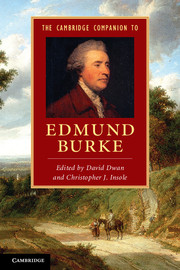Book contents
- Frontmatter
- Contents
- Contributors
- Acknowledgements
- Method of Citation
- Chronology
- Introduction Philosophy in Action
- 1 Burke’s Life
- 2 Burke, Enlightenment and Romanticism
- 3 Burke as Rhetorician and Orator
- 4 Burke’s Aesthetic Psychology
- 5 Burke on Law and Legal Theory
- 6 Burke on Political Economy
- 7 Burke and Religion
- 8 Burke and the Constitution
- 9 Burke and the Natural Law
- 10 Burke and Utility
- 11 Burke and the Ends of Empire
- 12 Burke and the American Crisis
- 13 Burke on India
- 14 Burke and Ireland
- 15 Reflections on the Revolution in France
- 16 Burke’s Counter-Revolutionary Writings
- 17 Burke in the United States
- Further Reading
- Index
- References
17 - Burke in the United States
Published online by Cambridge University Press: 05 December 2012
- Frontmatter
- Contents
- Contributors
- Acknowledgements
- Method of Citation
- Chronology
- Introduction Philosophy in Action
- 1 Burke’s Life
- 2 Burke, Enlightenment and Romanticism
- 3 Burke as Rhetorician and Orator
- 4 Burke’s Aesthetic Psychology
- 5 Burke on Law and Legal Theory
- 6 Burke on Political Economy
- 7 Burke and Religion
- 8 Burke and the Constitution
- 9 Burke and the Natural Law
- 10 Burke and Utility
- 11 Burke and the Ends of Empire
- 12 Burke and the American Crisis
- 13 Burke on India
- 14 Burke and Ireland
- 15 Reflections on the Revolution in France
- 16 Burke’s Counter-Revolutionary Writings
- 17 Burke in the United States
- Further Reading
- Index
- References
Summary
Leo Strauss’s Natural Right and History (1953) marked an important stage in his evolution into America’s Carl Schmitt. In its final chapter, he made the contentious claim that Burke, despite his readiness to invoke a universal natural law, was a historicist, in the sense that he regarded human rights, for instance, as the product of historical circumstances and not as deriving from abstract, universal principle. He was like Hegel in his preference for what is over what ought to be – a charge first made by Lord Acton that survives to the present day. In Strauss’s account, Burke unwittingly contributed to the erosion of the classical/Christian belief in a universal moral law and to the establishment in its place of the modern belief in the cultural relativity of values. This conclusion relocated Burke rather abruptly from what had seemed to be his increasingly secure position as an exemplary exponent of an anti-theoretical, pragmatic, even utilitarian approach to politics. His anti-revolutionary stance had regularly been praised as characteristically British or English, although his caution about circumstance and consequence was also often taken to be, at heart, utilitarian. These two elements formed a composite upon which his reputation rested easily for more than a century. Occasionally, tremors arising from his views on Ireland and India, or from allergic reactions to the florid complexion of his prose, or even, in Woodrow Wilson’s case, to his ‘brogue’, or from an alleged incoherence in his political philosophy or even from the accusation that he didn’t have one, shook the plinth on which he stood. The Burke who had so successfully opposed 1789 to 1688, the Irishman who was more British than the English could ever be, the crypto-Catholic who had a deeper vision of Anglicanism than any Anglican since Hooker, the former supporter of rebellion who became the scourge and analyst of revolution, presented so great a paradox that for two hundred years its resolution or dissolution became a structuring feature of the commentary upon him. The fright of the French Revolution had brought out his deepest convictions in a suddenly articulated but long-implicit political theology. Even when the apocalyptic tone faded, Burke’s polemic against ‘theory’ retained its force as the most enduring and identifiable feature of his work, adopted and adapted in the service of many causes.
- Type
- Chapter
- Information
- The Cambridge Companion to Edmund Burke , pp. 221 - 234Publisher: Cambridge University PressPrint publication year: 2012

